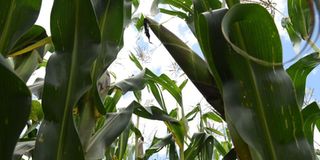Maize resistant to fall armyworm in the works

Bt maize has been safely used in other countries for nearly 20 years, with more than 25 countries growing it today.
What you need to know:
- The technology has the potential of lowering the cost of production and increasing yields.
- If approved, the variety will bridge the gap of 15 millions bags of maize imports occasioned by failed crop.
Farmers might benefit from a maize variety that can tolerate drought and be resistant to the devastating stem borer and fall armyworm pests in 2023.
The technology has the potential of lowering the cost of production and increasing yields.
Kenya Agricultural and Livestock Research Oranization Director-General Eliud Kireger said if approved, the variety will bridge the gap of 15 millions bags of maize imports occasioned by failed crop.
“Considering we are loosing about 40 per cent of maize to stem borer, which translates to 42 million bags of maize, what we are loosing is equivalent to the amount we import," said Dr Kireger. "We have been ready for a long time but politics in this country has prevented us from introducing the technology. “
Bacillus thuringiensis (Bt) is a species of bacteria that produces proteins that are toxic to certain insect. The chemical is infused into the maize seeds thus protecting the crops from adverse damages of stem borer and the fall armyworm
Refute cancer claims
However, there have been health concerns by lobbies on the approval of the Bt maize variety.
Principal investigator of the Tela project James Karanja refuted claims linking Bt maize to cancer. "There's no evidence that shows Bt causes cancer," said Dr Kireger.
The stem borer destroys 12 per cent of the nation’s maize production, while fall armyworm causes an average maize loss of 60 per cent, according to research by the Center for Agriculture and Bioscience International.
The government targets a seasonal maize production of 49 to 52 million bags per season.
For decades, countries planting Bt maize have recorded higher yields, low production cost, reduced application of insecticides, better human and environmental health and improved grain quality with low aflatoxin contamination.
Bt maize has been safely used in other countries for nearly 20 years, with more than 25 countries growing it today. The Bt contained in the current approval is also found in Bt sprays which are used in organic farming in Kenya.
The Tela maize will also help to make farming safer by reducing pesticide use and incidence of aflatoxin outbreak, while lowering overall production costs.
Tela is derived from a Latin word meaning double shield. The project aims to develop and deploy a GM insect-resistant maize variety that also has the ability to tolerate drought.



